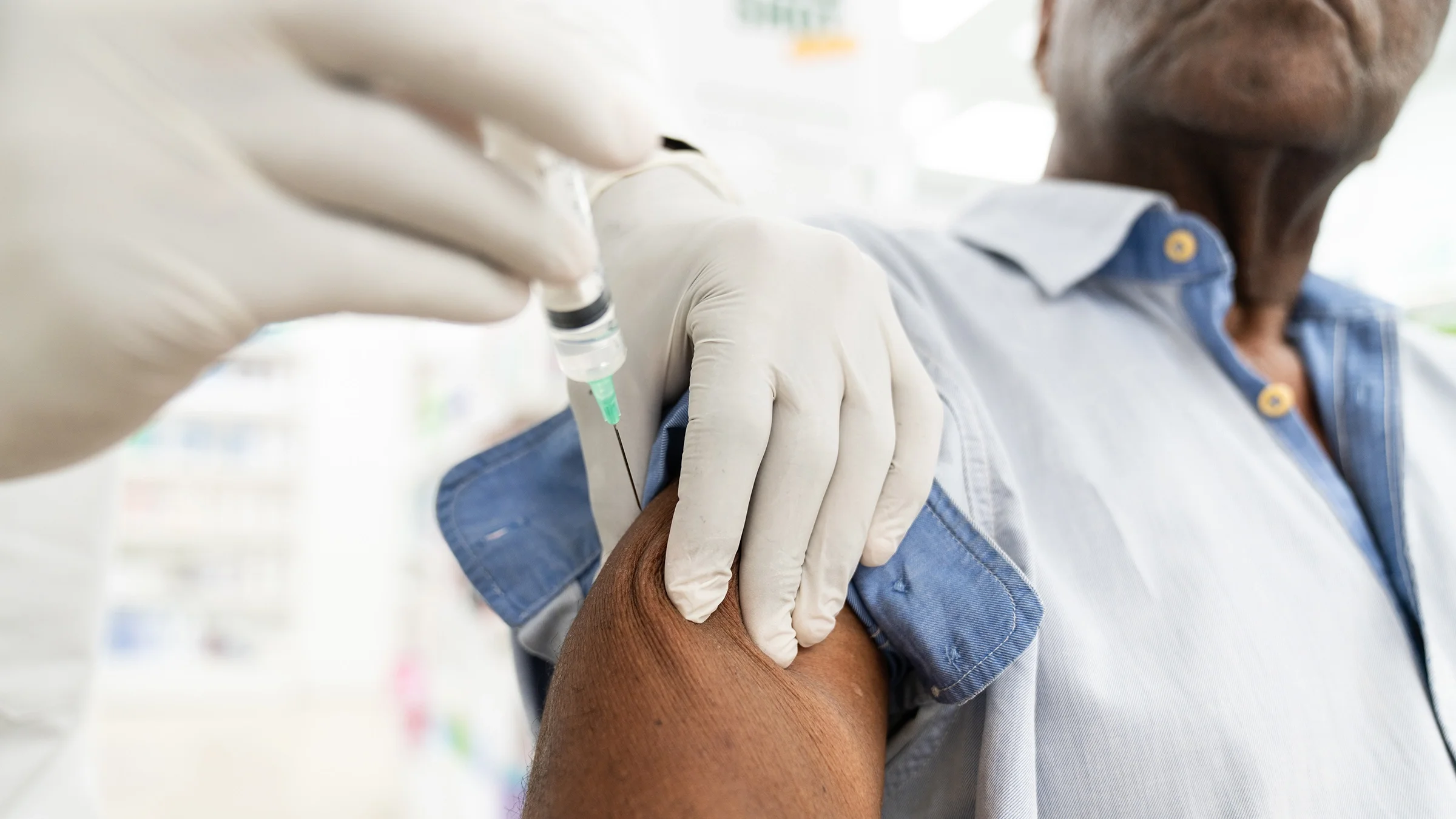Key takeaways:
Active infections with varicella zoster, the virus that causes shingles, may increase the risk for dementia.
Recent studies suggest that getting the shingles vaccine lowers the risk of both shingles and dementia.
Shingrix, the current shingles vaccine, is highly effective in preventing shingles. It’s recommended and widely available for U.S. adults ages 50 and older.
Linking a painful skin rash with memory loss may sound like a far-fetched idea. But shingles comes from a virus that lives in the nerve roots of the brain and spinal cord. When the virus is active, those nerves become inflamed or damaged.
But can the virus also lead to dementia? Read on to learn more about the shingles vaccine and its possible connection to preventing dementia.
Does the shingles shot prevent dementia?
Scientists have been looking at the ways different viruses affect nerve cells. And they’ve been researching whether vaccines could help protect brain cells from long-term damage.
Search and compare options
Recent evidence on the shingles vaccine and dementia
A recent study of more than 280,000 older adults in Wales, U.K., looked at the link between the shingles vaccine and dementia. And the study design was interesting.
When the shingles shot was first introduced, people born before a specific date weren’t eligible to get the shot in Wales. Researchers took advantage of this very unique situation: They examined health records for people born 1 week before and after that date. This allowed them to compare two groups of people, who were very similar except for whether or not they got the shot. And then the study measured how many people developed dementia over a 7-year period.
Around 12% of all people in the study developed dementia during that timeframe. But for those who got the shingles shot, the risk of dementia was 20% lower. The benefit of the vaccine was greater for women compared to men.
The difference between older and newer shingles shots
At the time of the Welsh study mentioned above, the original version of the shingles shot, Zostavax, was in use. Since 2017, Shingrix has been the only version used in the U.S. and in most countries. So, does Shingrix have the same protective effect for dementia?
A large 2024 study in the U.S. compared the effects of the old and new versions of the vaccine. People who got Shingrix were much less likely to have an episode of shingles. The risk of dementia was also lower with the current vaccine.
Once again, Shingrix lowered the risk of dementia more in women. And this is relevant, given that women are twice as likely to develop dementia. But it’s unclear why the shingles shot seems to lower the risk of dementia more for women. It suggests that women’s bodies and brains may respond in a different way to inflammation from infections — and respond differently to vaccines.
Can you prevent dementia? From daily exercise to getting your hearing checked, learn the best ways to keep your brain healthy as you age.
What’s your risk for Alzheimer's? We go through the key risk factors for dementia, plus the steps you can take to lower each one.
How much does the shingles vaccine cost? Without insurance, the shingles vaccine can be expensive. We explain how you can get it for free.
So, what are the take-home points from these studies? The main one is that both the U.S. and Welsh studies suggest the shingles vaccine is one way to decrease dementia risk. But there are some other points too:
The current version of the vaccine is better at preventing shingles than the older one.
It’s also better at activating the body’s immune system.
This may give brain cells an extra level of protection.
What about other vaccines?
Experts are actively looking into whether other vaccines can also lower dementia risk. One analysis of almost 2 million people around the world took a look at this question.
- NamendaMemantine
- AriceptDonepezil
- Memantine ERGeneric Namenda XR
Here’s what the analysis found:
In general, getting routine adult vaccinations reduced the risk of dementia by 35%.
The shingles shot lowered the risk by 31%.
People who received 4 or more yearly flu shots in their lifetime showed almost a 50% lower risk of dementia.
Does getting shingles increase your risk of dementia?
Herpes viruses have the strongest connection with dementia. These include herpes simplex viruses (HSVs), which cause cold sores (HSV-1) and genital herpes (HSV-2). The varicella-zoster virus (VZV) — which causes chickenpox and shingles — is also part of this family.
HSV-1, in particular, is associated with brain changes seen in conditions like Alzheimer’s disease. But the shingles virus also increases the risk of dementia.
Shingles doesn’t appear to lead to brain cell changes in the same way that HSV does. So scientists are still trying to understand how it affects the brain. The shingles virus may add to dementia risk by:
Causing inflammation in brain cells
Damaging blood vessels in the brain
Increasing the risk of strokes
Is the shingles vaccine used to lower dementia risk?
Dementia doesn’t have one single cause. That means there’s no one single way to prevent it. The good news is that there are many ways to lower your risk of dementia. Getting the shingles vaccine is one way to do that.
Having shingles doesn’t mean you’ll get dementia. But you can get shingles more than once. Each episode increases the risk for inflammation and nerve cell damage. So the shingles shot lowers risks even for people who’ve had shingles before.
The CDC recommends that adults ages 50 and older receive 2 doses of Shingrix. Those doses should be 2 to 6 months apart. That includes people who’ve had shingles in the past. And it includes people who received the older form of the shingles vaccine (Zostavax).
After both doses, Shingrix is more than 90% effective in preventing shingles. That can help prevent symptoms like severe, long-term nerve pain. And now it seems that the shingles vaccine may help protect nerve cells in the brain as well.
Does the shingles vaccine have long-term side effects?
Common symptoms after the shingles shot include headache, body aches, or feeling tired. That’s because the immune system is active. But those symptoms will only last a few days at most.
With any vaccine, there’s a small risk of having an allergic reaction. Or there’s a small chance of having a rare immune reaction that affects nerve cells, called Guillain-Barré syndrome.
But one large review looked at more than 90,000 older adults who received either the old or new form of the shingles vaccine. Neither group had serious or long-term side effects from the shot.
The biggest risk with Shingrix may be for people who don’t go back for the second shot. One study showed that 2 doses of Shingrix were excellent at preventing shingles over the 4 years of the study. But with only 1 dose, the vaccine was much less effective after 1 year.
The bottom line
Growing evidence suggests that shingles is much more than a bothersome rash. For some people, it leads to long-term nerve pain. It may also increase your future risk for dementia. Shingrix, the current shingles vaccine, is highly effective in preventing shingles. For those who are ages 50 and older, getting vaccinated may be one more way of protecting your brain health.

Why trust our experts?


References
Cairns, D. M., et al. (2022). Potential involvement of varicella zoster virus in Alzheimer's disease via reactivation of quiescent herpes simplex virus type 1. Journal of Alzheimer’s Disease.
Centers for Disease Control and Prevention. (2024). Shingles vaccine recommendations.
Eyting, M., et al. (2025). A natural experiment on the effect of herpes zoster vaccination on dementia. Nature.
Gomes, J. O., et al. (2023). Vaccines for preventing herpes zoster in older adults. Cochrane Database of Systematic Reviews.
Moutinho, S. (2025). Women twice as likely to develop Alzheimer's disease as men — but scientists do not know why. Nature Medicine.
Naquet, M., et al. (2024). The recombinant shingles vaccine is associated with lower risk of dementia. Nature Medicine.
Shin, E., et al. (2024). The associations of herpes simplex virus and varicella zoster virus infection with dementia: A nationwide retrospective cohort study. Alzheimer’s Research & Therapy.
Wu, X., et al. (2022). Adult vaccination as a protective factor for dementia: A meta-analysis and systematic review of population-based observational studies. Frontiers in Immunology.
Yeh, T., et al. (2024). Herpes zoster and long-term risk of subjective cognitive decline. Alzheimer’s Research & Therapy.
Zerbo, O., et al. (2024). Effectiveness of recombinant zoster vaccine against herpes zoster in a real-world setting. Annals of Internal Medicine.














